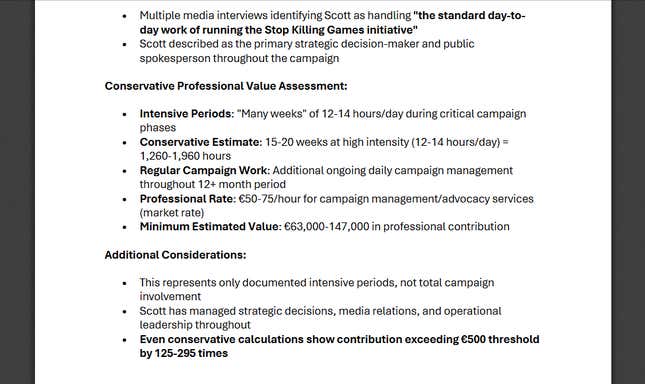The Stop Killing Games campaign has continued building momentum in recent weeks, even popping up during at least one publisher shareholder meeting. With over 1.4 million signatures in support, the EU petition “Stop Destroying Videogames” now has a real shot at forcing the issue with regulators there, though one of the campaign’s biggest promoters now claims someone is trying to derail the effort with false allegations against the petition. “Someone was gunning for us,” YouTuber Ross “Accursed Farms” Scott says in a new video. “This is a shot across the bow.”
He details a complaint sent to the EU Commission from an unknown user alleging the “Stop Destroying Videogames” EU petition violates disclosure rules. The complaint argues that while the petition states there are no sources of funding behind it, Scott’s ongoing promotion of the petition essentially amounts to professional contributions from a foreign entity.
“The €500 disclosure threshold is exceeded by approximately 125-295 times through Scott’s undisclosed professional time contribution, representing potentially the largest single source of campaign support,” the complaint alleges. “The concealment prevents informed citizen participation by misrepresenting the initiative as having no financial backing while substantially depending on foreign professional contributions.”
The entire argument rests on trying to ballpark the value of Scott’s time at between $55 and $85 an hour and the amount of time at up to almost 2,000 hours. The result is a non-monetary contribution of anywhere from $73,000 to $170,000 in value, the complaint claims. The estimates are based on his YouTube channel and an interview Scott did with PC Gamer in which he said, “I’ve been running a rickshaw carrying people to the destination.” The complaint does not include an estimate for Scott’s hourly rickshaw rate.

Throughout his latest video detailing the new twist in the ongoing Stop Killing Games saga, Scott tries to make clear that while he supports the EU petition, he’s not one of the organizers behind it, and the overall movement is not a “hive mind.” “The official organizers literally asked EU representatives if it was okay for me to assist them in the capacity I have been back in spring of 2024, just to make sure everything was above board in case there was a problem or we needed to report anything,” Scott says. “They said, ‘What I’ve been doing is fine.’ We’ve been doing this by the book, guys.”
It’s unclear who is behind the anonymous complaint. It could be someone appealing on behalf of video game companies in Europe whose lobbying entity previously released a statement rejecting the petition’s demands as too onerous and unworkable. Or it could just be some random internet user with an ax to grind against Scott as players debate the Stop Killing Games movement’s merits.
It was the decommissioning of Ubisoft’s The Crew that originally kicked the whole thing off, and the publisher’s CEO was recently grilled about the movement during its annual shareholder meeting. “The lifespan of a piece of software, whenever there’s a service component, eventually services may be discontinued, because eventually the software may become obsolete over time,” Yves Guillemot said at the time. “A lot of tools become obsolete 10 or 15 years down the line. They’re no longer available. And that is why we release a new version. And so we have version two and then version three. But clearly this is a far-reaching issue, and we are working on it.”
The EU petition is currently in a good position to actually force action on the issue. According to its organizers, it “seeks to prevent the remote disabling of videogames by the publishers, before providing reasonable means to continue functioning of said videogames without the involvement from the side of the publisher.” If at least 1 million signatures are proved to be authentic, the EU Commission will be tasked with addressing the group’s demands head-on within a six-month period, even if it ultimately chooses not to create a new regulatory framework around them.
.
